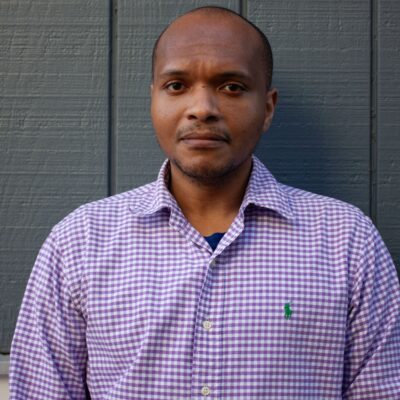Postdoc Spotlight: Reum Scott, Ph.D. ’19

April 22, 2024
Reum Scott, Ph.D. ’19, is a postdoc in materials science and engineering and chemistry and chemical biology from New York City, New York. He earned a B.S. from the University of Pennsylvania, a M.S. in chemistry from Howard University, and a Ph.D. from Cornell University. His research focuses on complex crystal structures and metal-organic frameworks.
What is your area of research, scholarship, or work and why is it important?
I work for Julia Dshemuchadse’s lab in the CAPE CryStAL (Computational Assembly, Phase Exploration, and CRYstal STructure Analysis Laboratory) group and the Phillip Milner group. CAPE CryStAL studies the self-assembly and stability of complex crystal structures using computer simulations. My colleague Maya once said, “As materials scientists, we really want to be able to synthesize and grow new materials. We have gotten good at looking a material’s structure and knowing what its properties would be. Unfortunately, we have a bad understanding of how crystalline structures grow, especially complex ones.” The Milner group studies the synthesis, self-assembly, and applications of metal-organic frameworks (MOFs). The appeal of MOFs are their tunable properties from chemical separations, gas storage, fuel cells, super-capacitors, and catalysis as a result of the variability of possible MOF components and the porous crystalline structure in which they form.
If materials scientists and chemists want to be able to make new materials with desired properties, then they need a better theoretical understanding of how these materials grow/assemble. Producing molecules such that they form a given ordered, crystalline structure with defined and ideally tunable materials properties is one of the central goals of materials design. I model the assembly of MOFs. My overall goal is to establish a toolkit and methodology to simulate the assembly of MOFs and using the kit and method to determine what properties of the MOFs components allow for a crystalline structure to form and why certain structures are favored.
What are the larger implications of this research, scholarship, or work?
Simulation can provide useful data to make seminal deductions if the simulation model can accurately represent key features of its real world analog. With the large datasets from the simulations and the ability to control the properties (size, shape, and intermolecular interactions), consistent design rules, and an understanding of the magnitude of changing specific properties in solution on the final assembled product can be gleaned. Being able to try, fail, and succeed multiple times without the personal time and/or financial investment and still learn the necessary lessons to make progress helps to move science forward.
What does it mean to you to be a Bouchet Scholar?
It means that I have the duty to be an example to people. I am somehow a role model despite my many flaws. I should probably let my good qualities show and maybe even codify them like Charles Foster Kane. I hope that I turn out better than him.
How do you exemplify the five pillars of the Bouchet Society—character, leadership, advocacy, scholarship, and service?
Now that I have received my Ph.D. and seen friends struggle and sometimes quit, I have been positioning myself as a student advocate and supporter along with promoting diversity and retention in academia. If I could become the academic equivalent of a cheerleader, I would. *Cue “Lean On Me” by Bill Withers.* I owe my success in academia to the people who have helped me to progress and picked me up when I stumbled and fell. I want people to be able to learn at any age or background and feel that they can find the means including people to help them progress in their quest for knowledge.
What are your hobbies or interests outside of your research or scholarship?
I like to build models. Mostly, Lego. When I can find the time and the sun is still out, I like to walk around Ithaca/Cayuga Heights and understand the terrain. It’s interesting to find out which roads lead where and how far away something really is. Things feel less far away once you know how much you have to walk. A metaphor for the Ph.D. and academia can probably be pulled from that. When idle, I play Pokémon. It helped me to understand object-oriented programming. I mostly watch films and marathon-watch television shows, sometimes repeatedly. Right now, I’m stuck on Columbo. I like detective fiction and sometimes like to imagine myself as a PI to bring excitement when things get dull. I recently started playing Dungeons & Dragons after wanting to for the past 12+ years.
Why did you choose Cornell?
Bill Nye is part of the reason that I am a scientist/engineer. Watching his show after school helped to shape my love of science and a need to investigate and understand. I met Bill Nye while volunteering and thought if I wanted to have the same impact on young people, I should follow the same path. Another science educator and humorist that I admire, Dr. Luke Landherr, graduated from Cornell’s CBE department. His webcomic, “Surviving the World,” and his work with Science The World are points of inspiration and aspiration.
Do you have any advice for current graduate students?
“If you’re going through hell, keep going.” – Winston Churchill. This quote is in my dissertation.
I would also add that there should be some sliver of hope, something that wills you to keep going, hope, stubbornness. Know yourself and have a solid idea of who you are and what you are trying to accomplish on a basic level. Your dreams and goals may change but if you have some solid and maybe idealized version of yourself, you can get through the worst of what life has to throw at you. Build yourself a pack, a unit, a support system.
